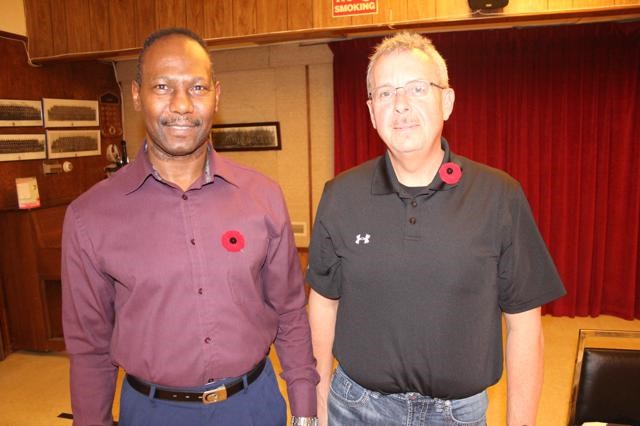The OSI-CAN support group, which meets in Weyburn and other centres around the province to provide support to first-response emergency personnel and members of the military, has a new provincial coordinator, Julius Brown, who paid a visit to Weyburn to be introduced to local personnel.
The support initiative is for those with operational stress injury (OSI) or post-traumatic stress disorder (PTSD), and provides a support for members of RCMP and municipal police, fire departments, EMTs and paramedics, and past and current members of the military. The provincial initiative is partnered with the Royal Canadian Legion, which hosts the meetings, and the Canadian Mental Association (CMHA).
Brown said the group meets to provide a confidential and safe environment where first responders can meet and share about what they’re going through because the others there know what experiences they’re having. OSI-CAN is currently operating peer support programs in Regina, Saskatoon and Prince Albert along with Weyburn, and Brown hopes to expand that to eight more cities in Saskatchewan in the coming months, starting with Moose Jaw in the coming week.
Brown noted that the centres outside of the major urban centres are most in need of their services, because they don’t have the access to resources that personnel have in the larger centres.
In addition to holding peer support groups, OSI-CAN also provide funds for service dogs who can be placed with people who would benefit from their companionship the most.
“We have two dogs being trained right now,” said Brown.
“We depend largely on members of these groups to tell us what their needs are, so we can identify how to help them,” he added.
A new provincial bill has been introduced that will help people with PTSD and related conditions, said Brown, and hopes it “will encourage people to come forward to seek help.”
In the past, a person had to provide proof to the Workmen’s Compensation Board (WCB) that they have a psychological injury, but under the new bill, introduced by minister Don Morgan, this will apply to all psychological injuries, and not just those with PTSD.
“Under the new bill, it’s assumed one has sustained the injury unless there is evidence to the contrary,” said Brown. “All too often there is stigma attached to mental health issues. We’re hoping to encourage those with psychological injuries will seek help, including filing a claim with the WCB.”
He added that the OSI-CAN organization is “ecstatic that this is finally come to the legislation table. There are still some questions that need to be answered.”
The OSI-CAN support group usually meets on the first Monday of the month at the Legion Hall, unless it needs to be reset to another time more convenient to those who attend the meetings.
Brown is originally from Charleston, South Carolina, and was in the U.S. Air Force during the time of the Viet Nam War, serving overseas in Thailand. He and his wife moved to Canada three years ago.



